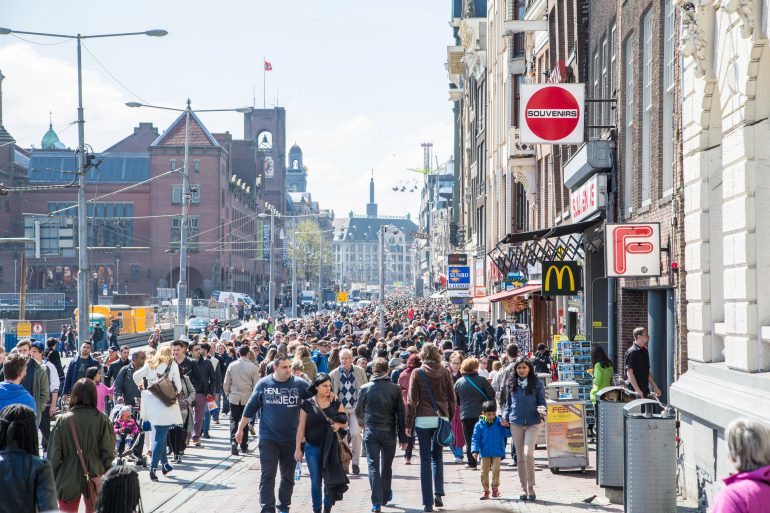Once considered a leader in municipal branding, Amsterdam has seen its reputation significantly decline, dropping from the top spot to sixth place in the latest national brand ranking. This shift comes from new research conducted by brand expert Hendrik Beerda in collaboration with the University of Amsterdam and Utrecht University, based on the views of 136,000 respondents across the Netherlands.
The annual Cities & Regions Brand Research evaluates all 342 Dutch municipalities on key criteria such as familiarity,appreciation, involvement, intention to visit, growth potential and overall reputation. Maastricht now tops the list, with Utrecht and Rotterdam following close behind – pushing Amsterdam out of the top five for the first time since the ranking began in 2011.
According to NH News, Amsterdam’s diminished image reflects a growing disconnection between how the city seesitself and how others experience it. ‘It is certainly not the case that people no longer want to go to Amsterdam. They do go there because they have a strong functional connection with the city. But they do not really like it,’ Beerda explains.
The most alarming drop is in the area of public sympathy. Once admired nationwide, Amsterdam now ranks just 155th out of 342 municipalities in terms of likeability.
Criticism centres around crowds and cost
Het Parool newspaper paints a sobering picture: the city is increasingly seen as ‘rude, unfriendly, expensive and busy’.Amsterdam’s identity – once based on openness, creativity, and diversity – is now tangled in complaints about tourism, traffic chaos, social fragmentation and unaffordable housing. ‘Amsterdam combines self-confidence with arrogance andrudeness,’ Beerda notes. ‘That is fine, but it does require a sympathetic attitude.’ Unlike Rotterdam, which scores high both in confidence and friendliness, Amsterdam is struggling with its public perception.
Others see the transformation of capital as both cultural and structural. A West Amsterdam resident reflected: ‘Electric bicycles chase everyone off the sidewalk, and public transport has been killed. Everyone has a short fuse, and almostno affordable houses are left.’
Still, not everyone agrees with the overwhelmingly negative image. One newer resident highlighted Amsterdam’s progressive, inclusive environment: ‘Amsterdam breathes inclusivity and has an open mind. At first, I didn’t like thatanonymity, but now I love that urban atmosphere.’
These divided opinions mirror what Beerda refers to as a ‘love-hate relationship’ that has long existed betweenAmsterdam and the rest of the country. But now, that tension appears to be tipping into general dissatisfaction.
Other municipalities on the rise
While Amsterdam’s brand is faltering, other municipalities are making significant gains. Texel, for example, is now themost appreciated municipality in North Holland and ranks fourth nationwide. ‘The island is popular in many ways,’ Beerda told NH News. ‘The atmosphere is good, and therestaurants are very good. It is a beautiful green island where you can enjoy a nice holiday.’ Texel’s success highlightsthe value of a positive, recognisable image. Its reputation benefits not just from natural beauty and quality tourism infrastructure, but also from consistent favourable media attention.
Conversely, Stede Broec has landed near the very bottom of the rankings – 339th out of 342. The municipality, home to villages like Bovenkarspel, Grootebroek and Lutjebroek, lacks recognition and emotional connection among Dutch residents. ‘It doesn’t really evoke warm feelings in anyone,’ Beerda said. ‘That name means almost nothing in terms of brand.’
Amsterdam at a crossroads
Despite the reputational downturn, Amsterdam still has the opportunity to recover. Beerda sees hope in events like Amsterdam 750, the city’s anniversary celebration, as a potential turning point. However, he warns that improving publicsentiment requires intentional effort.
For the capital to repair its brand, it must reconnect with values like tolerance, openness, and friendliness. Beerda echoes the words of the late mayor Eberhard van der Laan: ‘Be kind.’ He adds: ‘Welcome tourists, treat them kindlyinstead of chasing them away. Promote the nice, friendly side. But that will be a challenge.’
Whether Amsterdam rises again as the country’s most respected city brand will depend on how it redefines itself in the eyes of its residents and the rest of the Netherlands.
Written by Nicole Bea Kerr
